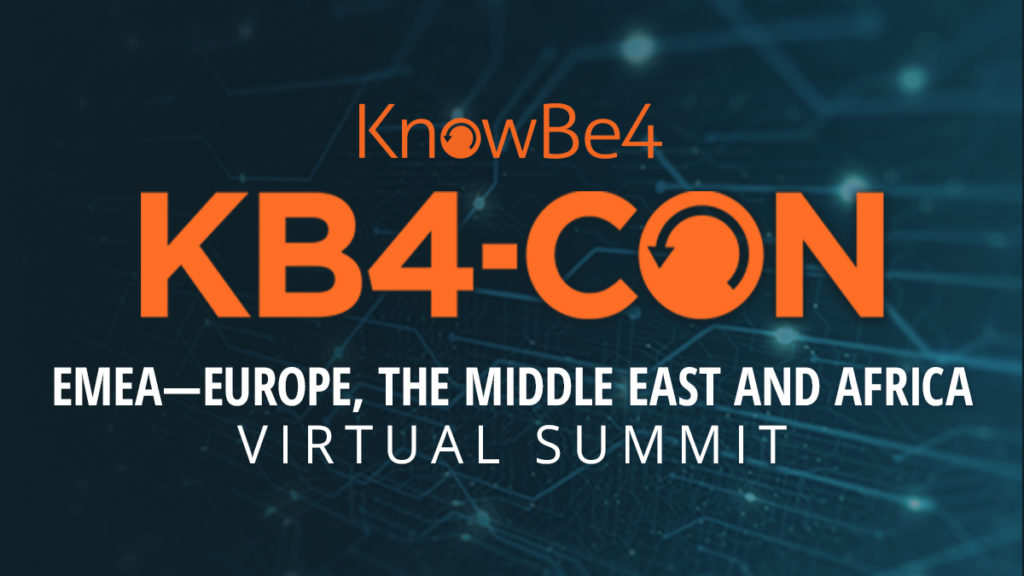
KnowBe4, the provider of the world’s largest security awareness training and simulated phishing platform, recently hosted a cybersecurity event KB4-CON EMEA, on the 23rd of September to help organisations in Europe, the Middle East, and Africa stay abreast of changing cyber threats.
Each year, the global economy loses billions of dollars to cybercrime and attacks which negatively affects thousands of organisations. Today, more smart devices are linked to the internet, and companies that fail to protect their IoT (internet of things) devices are leaving their IT architecture vulnerable to cyber attacks.
To kick start discussions for the day, Juliette Foster, journalist and founder of Magnus Communications, shared some insight around cybersecurity breaches and the unique challenges of organisations across the EMEA region. “The truth is every organisation is at risk of a security breach, for example in the UK, last year businesses faced at least 668,961 attempts to breach their systems online which translates to 1 attempted attack every 46 seconds and a 20% increase on the previous year. Although that rise might be fueled due to the pandemic and the shift in remote working, to some experts it reinforces the perception that some countries like the UK are still one of the most breached cyber security networks in the world,” said Juliet. She also added that these attacks are not only common, but the brazen confidence of attackers has cyber security professionals constantly needing to raise their security awareness level.
During the first session of the day, KnowBe4 Founder and CEO, Stu Sjouwerman, spoke about KnowBe4 vision and the idea behind its creation. “Social engineering was the problem and KnowBe4’s mission was to enable employees to make smarter security decisions, every day. Today, KnowBe4 has 41 thousand customers worldwide in 10 different countries, more than 1200 employees, and 7100 translations completed worldwide,” he said.
Sjouwerman also emphasised the lack of standardised cyber crimes and data protection regulations across Africa, and why that needs to change. “If we look at Africa with a median age of 20 years old, it’s the youngest population in the world and their growing youth is demanding access to global connectivity and driving technology adoption and smart device ownership is growing exponentially. Social media use is skyrocketing in Africa. Only 19 of the 54 countries across the continent have rectified the EU convention on cyber security, which makes Africa a very attractive market for cybercriminals.’’
The next session was led by Mikko Hyppönen, Chief Research Officer at F-Secure. In addition to demonstrations of advanced cybersecurity solutions, Mikko Hypponen discussed whether the internet was the best or worst innovation of the new era, and the different ways that global networks are affected by surveillance and cybercrime. According to Hyppönen, humans are living through multiple waves of a technological revolution.
“The internet is fast becoming an innovation as important as electricity is to our survival needs because if there’s an extended power shutdown anywhere in the world factories are unable to function which could result in a halt in food production. Eventually, internet connectivity will become as important as electricity,” said Hypponen.
In August 2021, Comparitech released research around cybercrime issues and found that the United Kingdom was among the top four countries with the biggest losses with 4.86 million cybercrime victims who lost $17.4bn. Data breaches cost UK enterprises an average of $3.88 million per breach, according to IBM and Ponemon’s Cost of a Breach study. 48% of UK organisations were hit by ransomware attacks in the last year, according to Sophos, and 13% of UK organisations reportedly paid the ransom.
In light of all these challenges, those to blame are not the users but the people who launch security breaches by creating BOT and DNS attacks. Medical data has also become a target for hackers and this is why companies have begun to focus and invest in making sure that there is a backup policy to reduce the risk of ransomware attacks.
During the event, Greg Kras, Chief Cloud Officer & Chief Product Officer at KnowBe4 also introduced the Kevin Mitnick Security Awareness Training Platform, while Chris Cline, Director of Product Management at KnowBe4 took attendees through some of the benefits of KnowBe4’s web-based platform PhishER.
To find out more about managing the continuing problem of social engineering with KnowBe4 and its integrated platform for security awareness training combined with simulated phishing attacks, visit www.knowbe4.com















